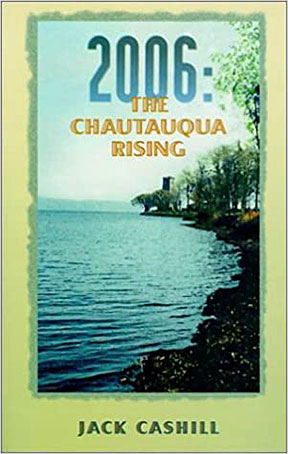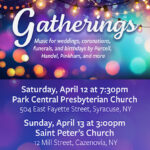2006: The Chautauqua Rising
It probably goes without saying that my home is filled with books. Books I’ve read dozens of times, books I’ve started and stopped and started again, and books I’d forgotten I ever had.
 I wanted to take a little summer break in my reading, and went to a “rarely visited” shelf, and found a pristine book, with no price tag glued on – so odds are I hadn’t found it in a bargain bin somewhere, and, though it was published way back in 2000, had never cracked open.
I wanted to take a little summer break in my reading, and went to a “rarely visited” shelf, and found a pristine book, with no price tag glued on – so odds are I hadn’t found it in a bargain bin somewhere, and, though it was published way back in 2000, had never cracked open.
As it happens, my parents had retired down in southwestern New York, and from time to time went to concerts at the Chautauqua Institution, so I was familiar with the town and its history.
In the 1870s, the New York Chautauqua Assembly was organized by a Methodist minister and a businessman on the shores of the lake of that name. The idea was to train Sunday school teachers, and also provide general entertainment and culture to the whole community by providing speakers, teachers, musicians, showmen, preachers, and other specialists to entertain and inform in a summery atmosphere of relaxation, picnics, and outdoor gatherings. The Chautauqua Institution grew out of that Assembly and continues to provide entertainment and education, and for a time, to hold a “Chautauqua” was to offer an educational assembly for the public anywhere one could be organized. Part of the purpose was to offer entertainment of a Christian nature, somewhat in competition with the vaudeville so popular in that era.
I was curious about not just how and when I’d gotten the book – and why I’d never read it – and what a “rising” in conjunction with Chautauqua could be.
I wasn’t prepared for a story that was as eerily prescient as this was, reading it with the advantage of a 22 year look-back. Granted, some of what the author predicts took a bit longer than 6 years to rear its head, but any reader will recognize some of the movements and manipulations of modern American culture that were still the stuff of fiction that long ago.
What’s also fascinating about this book is the writer’s proposed political/social affiliation of such wildly disparate groups: imagine Native Americans, Amish farmers, traditional Catholics, a nationally acclaimed folk singer, and a mysterious mission, and a newspaper, handed over to the son of a supposed suicide, all coming together to face down the forces at play in the government.
It sounds far crazier than it reads. The book is written diary-fashion, and from the point-of-view of the young son of a beloved father who, he discovers in the first pages of the book, has shot himself, and left his small newspaper to his son to run. At first, the heart-broken TJ Conlon simply wants to figure out what to do about the paper, and to understand why his father would choose suicide. And then, as they say, the plot thickens. TJ returns to his roots – Chautauqua County – and through a chance encounter, discovers a clue in a mysterious tape. Now intrigued and determined to figure out what happened, and tasked with writing an editorial column for the small periodical he had inherited, TJ leaves his Boston career and ambitious girlfriend behind, and sets out to understand what happened, and why.
What sets this whodunit apart from many others is not just the fun I found in reading about places like Salamanca, Fredonia and even the growing Amish community in southwestern NY that were so familiar to me, but in the more political tidbits Cashill envisioned eventually bringing change and challenge to particularly such stalwart and independent communities as the Seneca people, or the Amish farmers and woodshops.
The political catchphrase is “Is It Good for the Children?” when the government wants to enact a demanding rule – such as insisting that workers in a small Amish woodmill wear hard hats, or that children normally schooled in local community-run classrooms be bussed to large “centralized” facilities. The closer TJ gets to the answer to his father’s story, the more involved he becomes in what’s driving the political forces at play behind these and other moves to control the lives of the quiet, private people depicted in the story.
This is exactly the type of book I love to stumble across for summer reading. I don’t like the over-worked phrase “page-turner” to describe a story, but I will plead guilty. Once started, I had to find out “what happened,” and couldn’t help but marvel at some of Cashill’s “what-if’s” on the potential horizon.
2006: The Chautauqua Rising by Jack Cashill, published: 2000











